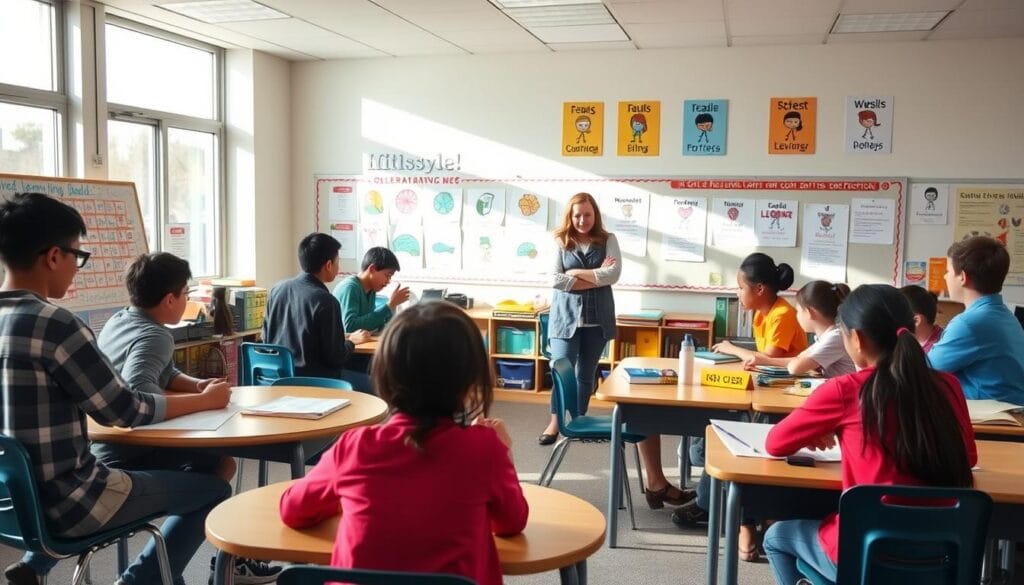Respecting Teachers: A Key to Enhancing Student Performance
As a parent, your view of teachers greatly affects your child’s school success. Showing respect for teachers is key to creating a supportive learning space. This respect helps your child reach their full potential in school.
فهرس المقالة
Understanding the Impact of Teacher Respect on Academic Success
Building a strong teacher-student relationship is key for success in school. When students see their teachers as respectful and supportive, it greatly affects their school performance. Let’s explore why these relationships matter and the benefits they bring.
The Psychology Behind Teacher-Student Relationships
The bond between teachers and students is more than just sharing information. When students feel respected, they build trust, motivation, and interest in learning. This positive connection boosts their self-esteem, improves their behavior in class, and encourages them to take on new challenges.
Research-Backed Benefits of Teacher Respect
- Improved academic performance: Studies show that students who feel respected by their teachers do better in school.
- Enhanced social-emotional skills: Respectful interactions help students develop important skills like empathy and problem-solving.
- Reduced behavioral issues: Feeling respected helps students behave better in class, creating a better learning environment.
Long-Term Educational Outcomes
Teacher respect has lasting effects beyond school. Students who have positive relationships with their teachers are more likely to love learning, go to college, and become active citizens. This shows how crucial it is to build a culture of respect in schools.
By understanding the role of teacher respect in success, we can help teachers and parents build stronger connections. This supports students’ growth and development in all areas.
The Foundation of Respecting Teachers by Parents

Starting to respect teachers begins at home. As parents, your actions and words greatly influence your kids’ views on teachers and learning. Parental involvement and role modeling are key in creating a positive view of teachers in your family.
When parents show respect and gratitude towards teachers, kids see them as important figures. This respect helps build strong teacher-student relationships. These relationships are linked to better grades and a better educational experience.
- Encouraging open communication between parents and teachers
- Highlighting the important role teachers play in a child’s life
- Avoiding criticism of teachers in front of children
- Supporting school policies and initiatives
- Expressing gratitude and appreciation for teachers’ efforts
Creating a home that values and respects teachers helps raise a generation that sees teachers as crucial. This parental involvement and role modeling is the start of a great educational system. Here, teachers and students work together to achieve academic success.
| Parental Factors | Impact on Teacher Respect |
|---|---|
| Open communication with teachers | Fosters stronger teacher-student relationships |
| Expressing gratitude and appreciation | Boosts teacher morale and motivation |
| Supporting school policies and initiatives | Reinforces the authority and role of teachers |
| Avoiding criticism of teachers in front of children | Prevents undermining of teacher’s credibility |
By actively showing respect for teachers, parents help their kids succeed in school. This creates a positive learning environment that benefits everyone.
Building Strong Parent-Teacher Relationships
Creating strong bonds between parents and teachers is key to a supportive learning environment. When parents and teachers work together, they can improve student success. By focusing on open communication, active participation, and respect, you can build a strong relationship that helps everyone.
Effective Communication Channels
Good communication is the base of a strong parent-teacher bond. Use emails, phone calls, and meetings to keep parents updated on their child’s progress. Encourage parents to share their thoughts and concerns, creating a dialogue that builds trust and understanding.
Attending Parent-Teacher Conferences
Parent-teacher conferences are a great chance to talk about your child’s progress and growth. Prepare by gathering important information and be ready to discuss both strengths and areas for improvement. By actively taking part in these meetings, you can strengthen the parent-teacher relationship and support your child’s success.
Supporting School Policies
Showing support for school policies helps build trust and strengthens school-home communication. Learn about the school’s rules and educational methods. By demonstrating parental involvement and supporting the school’s vision, you help create a unified learning environment.
| Communication Channel | Advantages | Considerations |
|---|---|---|
|
| |
| Phone Calls |
|
|
| In-Person Meetings |
|
|

Teaching Children to Value Educational Authority
Teaching kids to respect teachers is key for their success in school. As parents, you have a big role in shaping their views on teachers and schools. By showing respect for teachers, you help your kids develop important skills for school.
One great way to teach kids about teacher authority is by leading by example. When you talk positively about their teachers, you send a strong message. Kids learn a lot from what they see at home.
It’s also important to encourage talking with teachers. Go to parent-teacher meetings and get involved in your child’s learning. This shows you care about their success and builds a strong team effort.
Teaching kids about the value of following rules is crucial too. Explain why school rules are important. Tell them that respecting teachers helps create a better learning space and teaches them valuable life skills.
Respecting teachers is a key to success in school and life. By showing this respect and teaching your kids, you’re preparing them for a bright future.
| Strategies for Teaching Children to Value Educational Authority | Benefits |
|---|---|
|
|
By using these strategies, you can help your kids appreciate the value of teacher authority. This will help them grow academically and personally.
Practical Ways to Show Teacher Appreciation
As parents, we all want to thank the hard-working teachers who help our kids learn. Building a strong school-home communication and parental involvement in teacher appreciation is key. It greatly impacts student success and the school community.
Meaningful Recognition Ideas
Small gestures can show a teacher how much you care. Think about handwritten thank-you notes, small gifts like classroom supplies or gift cards. Or, organizing a class gift to honor their hard work. Joining teacher appreciation events at school is also a great way to show support.
Supporting Classroom Initiatives
- Volunteer your time for classroom projects or school events.
- Help out by contributing to the teacher’s wish list or donating items.
- Be a chaperone on field trips or share your skills to make learning fun.
Professional Boundaries
It’s vital to build strong parental involvement and school-home communication. But, it’s also important to respect teachers’ professional space. Don’t overstep or ask too much, and remember their work-life balance. Talking openly and respectfully helps create a better learning environment for your child.
“When teachers feel valued and respected, it not only benefits the students but also creates a more positive and productive school environment.”
Addressing Conflicts Constructively
Conflicts between parents and teachers can happen, but we must handle them well. By talking openly and working together, we can keep a positive learning space. This space is good for students and the whole school.
Good communication is key in solving conflicts. Encourage parents and teachers to listen well, ask questions, and understand each other’s points. This way, we avoid making wrong assumptions and focus on finding solutions.
When dealing with conflicts, finding the real cause is important. Then, work together to find solutions that everyone can agree on. This might mean finding new ways to solve problems or clearing up any misunderstandings.
Also, having clear rules for handling conflicts helps keep things fair. This includes having specific ways to talk, set times for solving problems, and a clear plan if things don’t work out at first.
By focusing on solving problems together, we can make the parent-teacher relationship stronger. This also keeps school-home communication positive. In the end, this helps everyone in the school do better and succeed in their studies.

“The most important single ingredient in the formula of success is the ability to get along with people.” – Theodore Roosevelt
Creating a Culture of Respect in Education
Creating a culture of respect in schools is key to better learning. Parents, teachers, and school leaders can work together. They can make a place where everyone values learning and helps students do well.
Role Modeling Respectful Behavior
Parents should show respect for teachers and school rules in front of their kids. When you praise your child’s teachers and work with them, you teach your child to respect schools and those in charge. This helps your child understand why teachers are important.
Community Involvement Strategies
Getting involved in the school community helps build respect too. Go to school events, help out in classrooms, and join parent groups. By doing this, you show you care about your child’s education and the teachers who help them.
Building School Spirit
Having school spirit is also important. Encourage your child to join clubs, sports, or other activities. When students feel connected to their school, they’re more likely to respect the teachers and leaders who guide them.
By showing respect, getting involved, and building school spirit, we can make schools better places. Parents, teachers, and leaders can all help create a place where respecting teachers by parents is valued, educational values are upheld, and parental involvement is encouraged.
| Strategies for Creating a Culture of Respect in Education | Benefits |
|---|---|
| Role Modeling Respectful Behavior | Reinforces the importance of respecting teachers in the child’s mind |
| Community Involvement Strategies | Demonstrates commitment to the educational process and the role of teachers |
| Building School Spirit | Fosters a strong connection to the school, leading to greater respect for teachers and administrators |
“When parents, teachers, and the community work together, students thrive. A culture of respect is essential for academic success and personal growth.”
The Role of Digital Communication in Teacher Respect
In today’s world, how we talk to each other has changed a lot. This change affects how we see and talk to our kids’ teachers. It’s key to know how tech tools shape our views and actions towards teachers.
Digital tools make it easier to talk more often and clearly with teachers. Online platforms, email, and messaging apps help parents and teachers keep in touch, share news, and solve problems quickly. This can make the parent-teacher bond stronger, building trust and teamwork.
But, digital talk can also lead to misunderstandings and feel less personal. It’s vital to make sure tech doesn’t lessen the respect and authority of teachers. Keeping the right distance, being careful with our words, and saving serious talks for face-to-face meetings helps keep things professional.
Fostering Respectful Digital Interactions
- Learn about the school’s rules for digital talks to match their standards.
- Don’t use digital spaces to vent or make demands. Instead, focus on finding solutions together.
- Think about your tone and words online, as you can’t see each other’s body language.
- Respect teachers’ personal time and space by only talking when it’s right and through the right channels.
By finding a balance between digital ease and respect in our talks, we can create a better learning environment. This environment supports students’ success and builds trust and understanding between everyone.
“Effective communication is the foundation of a strong parent-teacher relationship, and digital tools can be a valuable asset in this endeavor – if used thoughtfully and with respect.”
Conclusion
This article has shown how respecting teachers greatly affects student success and the education system. We’ve looked at why teacher-student relationships matter, the benefits they bring, and their lasting effects. It’s clear that valuing respect in schools is key for students to do well.
As parents, you are very important in teaching respect for teachers. By working closely with teachers, talking openly, and supporting school rules, you help your kids learn to respect educators. Also, teaching your kids to value teachers helps them grow both academically and personally.
Showing teachers you appreciate them can make a big difference. This includes thanking them, helping out in the classroom, and keeping professional lines clear. It also helps to solve problems and build a respectful school environment. By being a good example, getting involved in the community, and boosting school spirit, we can make education better for everyone.
FAQ
Why is it important for parents to respect teachers?
Respecting teachers is key to better student performance and success in school. When parents show respect, it creates a positive learning space. It also strengthens the bond between teachers and students, showing the value of education.
How does teacher respect impact a student’s academic achievement?
A good teacher-student relationship, based on respect, boosts academic results. It makes students more engaged and leads to better educational outcomes.
What are the key principles behind respecting teachers as a parent?
Respecting teachers starts with understanding their vital role in a child’s growth. Parents should value teachers’ knowledge, support their classroom rules, and show respect at home.
How can parents build strong relationships with their child’s teachers?
Building strong relationships involves good communication and regular meetings. Supporting school policies and working together helps create a positive learning environment.
What can parents do to teach their children to value educational authority?
Parents can teach respect by being respectful themselves and explaining the importance of classroom rules. Helping kids see the teacher’s role in their learning is also key.
How can parents show their appreciation for teachers?
Showing appreciation can be done through recognition, supporting classroom projects, and keeping professional boundaries. This strengthens the partnership between home and school.
How should parents address conflicts with teachers constructively?
When conflicts happen, parents should talk openly and try to understand the teacher’s side. Focusing on solving the problem helps keep the learning environment positive.
What role does digital communication play in fostering respect for teachers?
Digital tools can improve communication between home and school. But, parents must be careful and professional online. Keeping boundaries and respecting teachers’ authority is essential.






